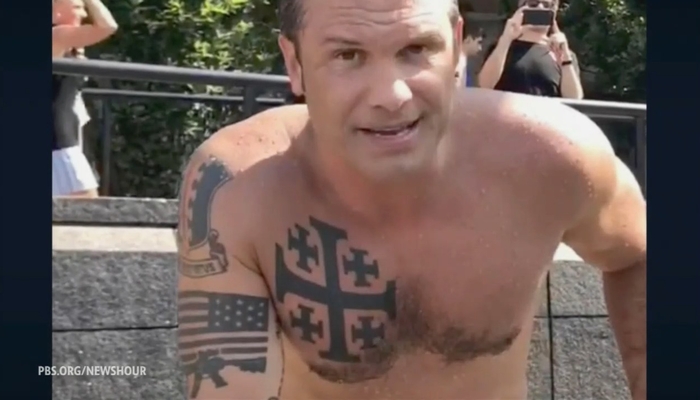We support our Publishers and Content Creators. You can view this story on their website by CLICKING HERE.

Thursday’s PBS News Hour welcomed back Brad Onishi (host of the podcast “Straight White American Jesus”) to warn once again about scary Christian conservatism, this time encapsulated in Pete Hegseth, Donald Trump’s nominee for Secretary of Defense, interviewed by the show’s most biased reporter, Laura Barron-Lopez. Onishi compared Hegseth to mass shooters and to white nationalists eager for a “holy war.”
Onishi smeared Republican House Speaker Mike Johnson as a Christian supremacist on the show back in February (also a Barron-Lopez interview) and PBS invited him back to do a similar hit job on Hegseth.
Anchor Geoff Bennett set Hegseth up for the double battering.
PBS paints itself as an oasis of civil discourse — as its expert compares Hegseth to mass murderers Anders Breivik (77 dead) and Brenton Tarrant in Christchurch (51 dead). Onishi is the extremist here. The interviewer is pleased with all this.
Guilt by association rolled down like water. Even the “defense” portion of Barron-Lopez’s interview was an open-ended setup for Onishi to refute.
Barron-Lopez said Hegseth has “railed against diversity in the military, probably including Hegseth’s supposed opposition to women in the military (false). Onishi went back to the “holy war” talk once more:
PBS News Hour
12/12/24
7:32:06 p.m. (ET)
Geoff Bennett: President-elect Donald Trump’s nominee for secretary of defense, Pete Hegseth, continued to press his case on Capitol Hill today, meeting with his first Democratic senator, Pennsylvania’s John Fetterman.
Geoff Bennett: Hegseth has faced allegations of sexual misconduct, excessive drinking and financial mismanagement, which he denies. Laura Barron-Lopez is here now to discuss something else that’s drawn scrutiny, the influence of Hegseth’s religious beliefs
Laura Barron-Lopez: Pete Hegseth has said faith became real for him around 2018, years after his service in Iraq and Afghanistan. He went on to write a number of books and has made frequent appearances on conservative podcasts and shows, in which he discusses his Christian ideology.
Those writings, comments, and even Hegseth’s tattoos have gotten increased attention in the weeks since Trump’s announcement.
For more on what’s known about Hegseth’s beliefs and how they may influence his leadership at the Pentagon, we’re joined by Brad Onishi, who studies religious extremism and co-hosts the podcast “Straight White American Jesus.”
Brad, thank you so much for joining the “News Hour.”
Let’s start with what Hegseth has said explicitly. In his 2020 book, he wrote: “We don’t want to fight, but like our fellow Christians 1,000 years ago, we must. Our American crusade is not about literal swords, and our fight is not with guns yet.”
What does this kind of language, along with Hegseth’s writings and other comments, tell you about his beliefs?
Brad Onishi, Co-Host, “Straight White American Jesus”: Well, Hegseth puts himself in the category of an American crusader, drawing inspiration from the Crusades in the medieval period.
But many Christians don’t see the crusades as a high point in the Christian tradition. What we do know is that those who don the crusader identity, those who use its symbology and its stories as inspiration, are often part of white nationalist and Christian nationalist movements and, in tragic cases, have waged holy war themselves.
Anders Breivik referenced the Knights Templar in his act of terrorism. The Christchurch shooter emblazoned Crusader symbology on his weapons. So the use of these symbols from any Christians is alarming, and yet these are the ones that Hegseth has chosen as his understanding of where Christians stand today.
Laura Barron-Lopez: Let’s talk about some of those symbols. A lot of attention has been paid to Hegseth’s tattoos, a Deus Vult one that has been adopted by white supremacists, a Jerusalem cross tattoo.
And those were flagged by a fellow National Guardsman, which then led to Hegseth being pulled from protecting President Biden’s inauguration in 2021. Tell us about those tattoos and what they symbolize.
Brad Onishi: Well, those tattoos are, again, symbols that are used by white Christian nationalists. Those who have adopted these Crusader images really see themselves as at war with those trying to take down American Christianity and Western civilization at large.
That means members of the LGBTQ community. That means trans people. That means those who don’t see themselves as part of a Christian society. There’s a temptation, I think, to write off Hegseth’s tattoos as just an expression of his faith or to say they’re no big deal. But we just talked about him as donning in a Crusader identity.
And as somebody who’s a former minister, somebody who has been studying Christianity for two decades now as a scholar, I can tell you there are thousands of symbols and sayings and icons that Christian people use to express their spirituality on their bodies and their homes and in public.
There are expressions of faith and peace, of love and forgiveness, but those are clearly not the ones Hegseth has chosen.
Laura Barron-Lopez: President-elect Trump’s transition team did not respond to requests for comment about Hegseth and his beliefs, but Hegseth and others have said that those tattoos are ones that a number of veterans have. They have also argued that his Christian beliefs are not extremist.
How do you respond to that?
Brad Onishi: Well, what I would say is that the evidence shows us that those who don those tattoos are prone to take part in extremist communities.
It can be hard to pin intentionality on people, but when somebody says that they think we should fight like we’re in a modern-day Crusade and then they Don the symbols of that Crusade, I think we should take them seriously.
Laura Barron-Lopez: I also want to ask you about the specific church that Hegseth has attended in Tennessee. It’s part of a denomination founded by Doug Wilson, a pastor in Moscow, Idaho.
What beliefs does that denomination promote and why are they significant?
Brad Onishi: Doug Wilson is a firebrand pastor and theologian. He is somebody who reaches millions of people through his podcast, through his writings, through the schools that he’s founded and the denomination of which Pete Hegseth’s church is a part.
Wilson is known for radical beliefs about gender. He doesn’t believe that women should have any authority in the home or in society, much less the church. He has said that the time of enslavement in this country was the time of harmony between the races.
If you don’t share the same hymn book as Wilson, then you can’t be mayor. If you’re a Hindu or Muslim, you simply can’t hold any kind of authority in our public square. Hegseth not only attends a church that is part of Wilson’s denomination, but he’s claimed Wilson as a kind of spiritual mentor.
So, if we have Wilson saying that non-Christians shouldn’t hold positions of leadership, and Hegseth claiming him as a spiritual mentor, it makes me wonder that, if Hegseth is secretary of defense, can the non-Christian, the Muslim, the Hindu, the agnostic or the atheist in our armed services rise the ranks to positions of authority?
Can they be captain? Can they be sergeant? How will they be understood in the context of service under Hegseth’s leadership?
Laura Barron-Lopez: On that big picture, if Hegseth is ultimately confirmed to lead the Pentagon, he’s railed against diversity in the military.
But, taken all together, what do you think it means if he ultimately is atop the Department of Defense
Brad Onishi: I think it means a lot.
I think that one thing we need to get straight is, our Armed Services are one of the most diverse institutions we have in the country. And so to rail against diversity is to enter a context in which we have one of the most diverse services our nation has to offer.
But I think, additionally, Hegseth is symbolic. Hegseth represents a U.S. military envisioned as a vehicle for holy war. He’s claimed to be a Christian Crusader, and that seems to be the kind of mentality he wants to implement as a leader.
I think, additionally, Hegseth is your pick if you want to radicalize our military. Hegseth has said in his writings that he believes there are enemies within our own country, those who are trying to destroy the country from within our borders.
If you want to be the kind of president who uses the Insurrection Act, to call in the military against uprisings in American cities, to use military force against protesters, Hegseth is the man for the job. And he will do so believing that he’s not waging some kind of brutal criminal act, but instead a holy war against the infidels within America’s city gates.
Laura Barron-Lopez: Brad Onishi, thank you for your time.
Brad Onishi: Thank you.

 Conservative
Conservative  Search
Search Trending
Trending Current News
Current News 





